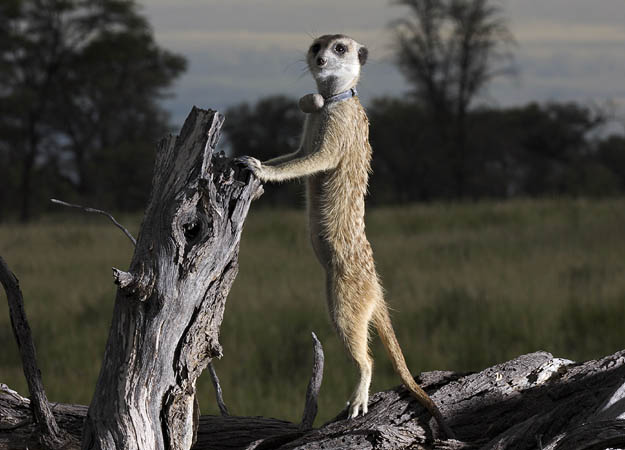Sentinel Behavior in Meerkats
Biology 342 Fall 2010
Amber Bang and Mischka Moechtar

Meerkat on a raised position. Photo courtesy of Animal Planet's Meerkat Manor
Meerkats are often used as model organisms for altruistic behavior due to their cooperative breeding and feeding, as well as community guarding. However, a paper published in 1999 shed some light on guarding, or sentinel behavior, suggesting meerkats to be more selfish and less altruistic than formerly thought. We will be solely addressing sentinel behavior, breaking it down using Nikolas Tinbergen's four questions to explain animal behavior. These four questions deal with the following:
- Mechanism
- Ontogeny
- Adaptive Value
- Phylogeny
We'll explain the implications of each of these categories in their individual sections, which can be accessed by clicking one of the links on the left.
Meerkat Lowdown
Meerkats (Suricata suricatta) belong to the mongoose family. These African desert dwellers form close-knit societies composed of up to fifty meerkats. Unlike their relative the mongoose, who chooses to live solitarily, meerkats are known to have some of the most cooperative societies. They inhabit all parts of the Kalahari Desert in Botswana, South Africa, and Mozambique.
The Sentinel Role
The sentinel role is performed by a helper, or a non-breeder, meaning he or she is on the lookout, watching for possible predators and other potential threats to the community. This behavior is also called the raised guarding position. This position rotates amongst different members of the group in no particular order or structure. Sentinels are usually around when the group is foraging away from the burrow. The meerkat on the lookout will sound an alarm by producing a distinct bark. This allows the offspring to escape inside the burrows and under protection of adults. Several explanations exist for the evolution of sentinel behavior. Some have constructed theories based on kin selection or reciprocal altruism, while the Clutton-Brock paper mentioned above proposes simply that the individual's optimal activity is to be on guard once its stomach is full (Clutton-Brock et al. 1999b).
Selfish Sentinels?
The role of the sentinel had been thought to be altruistic for quite some time before Clutton-Brock et al 1999b published research that proposed meerkats who take on the role of sentinel are actually doing so in order to serve their own interests. Yet, their selfish behavior is the group's saving grace as a whole, because the sentinel is still responsible for alerting others who may be busy foraging for food to the presence of predators. This selfishness hypothesis would reject the general notion of the altruistic sentinel, and has in fact provided a foundation for later research that in turn has produced further theories concerning motivation behind sentinel behavior.
Cooperativeness
The Merriam Webster dictionary defines altruism as "behavior by an animal that is not beneficial to, or may be harmful to, itself but that benefits others of its species". Meerkats playing sentinel, however, do benefit from this role. Thus, the more appropriate term to describe such behavior would be cooperative rather than altruistic, as viewing the sentinel role as purely altruistic behavior would make it to be evolutionarily unfavorable since the giver is endangering his or her own life.